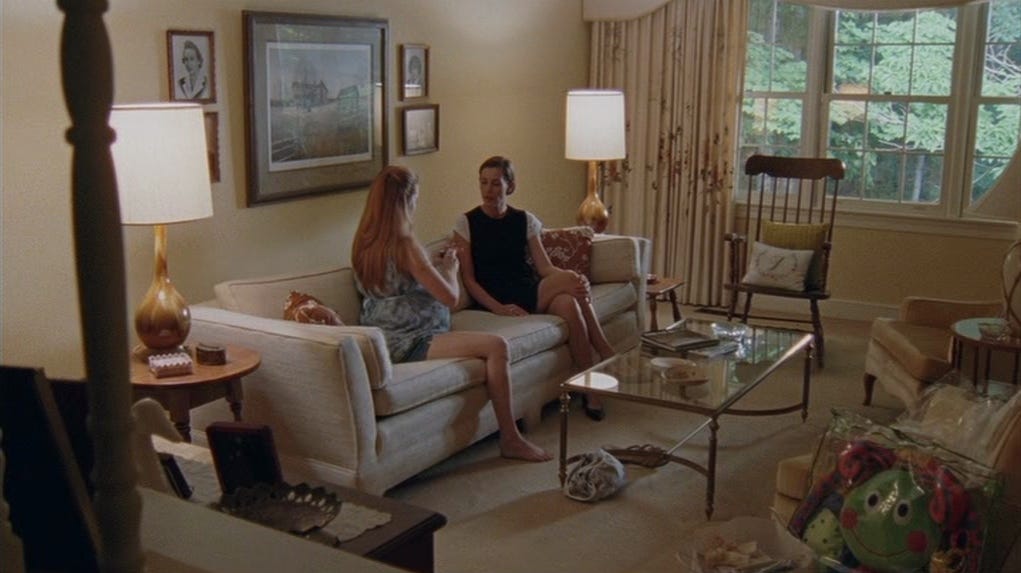Junebug (2005)
"Meeting the parents" is a well-worn movie premise, ripe with dramatic potential for dinner table tension, awkward misunderstandings and growing antagonism. But rather than a stern Robert DeNiro to contend with, here Embeth Davidtz, playing Madeleine, an urbane and terminally polite art dealer from Chicago, relies on the hospitality of her husband's parents (low-key character actors Celia Weston and Scott Wilson) along with the OC's Ben McKenzie, her sullen soon-to-be brother-in-law. It's less about impressing her in-laws, more about acclimatising to their way of life, that is, genteel North Carolina conservatism. There is also Ashley (played by an astonishing Amy Adams), McKenzie's pregnant wife, who injects a sense of relentless optimism in a household of reserved world-weariness.
Davidtz' Madeleine is newly wed to George (Alessandro Nivola), who she met at an art auction and got engaged within a week. They take a trip to visit his parents, as well as dropping in on an "outsider" artist, whom Madeleine is courting to show his work at her gallery. Throughout the film Davidtz' manners and artistic sensibilities are met with bemusement from the family. She is a fish out of water, a different creature than her in-laws perhaps might have expected their son to partner with. In one of the early scenes, Adams' Ashley quizzes Madeleine about her whole life, and is fascinated by Madeleine's answers, in disbelief to learn that she was born in Japan. This scene announced Amy Adams as a major talent on film, and the reaction from cinema audience was palpable. Ashley is hungry for some receptive female company, fascinated by this exotic being that has found her way into her world. She believes that a baby will help her marriage to McKenzie, and appears to thrive in the state of pregnancy. What this baby represents is hope, hope for renewal and purpose in a so-called provincial world.
Madeleine tries valiantly to be of service to her hosts, even helping McKenzie's character to study Huckleberry Finn for his high school equivalency course. She is met with an explosion of frustration - her intellectual prowess met with the misplaced anger of a culturally limited man. There is another moment of confrontation (albeit far gentler) in a community centre, during a church social, in which Nivola and two other male parishioners, take part in a performance of "Softly and Tenderly", a hymn that seems to open Davidtz eyes to an entirely different perspective, a different side to her husband of which she may not have previously been aware. Another set-piece is the baby shower, where we meet more of the neighbours and get a greater sense of the community in which this family exists, where Madeleine gifts Ashley an antique silver spoon, much to the befuddlement of her mother-in-law.
This is a film unconcerned with the contrivances of a traditional "plot". It could even be described as a "hang out" film, where, instead of some college dorm, the venue is the quiet domestic setting of this dysfunctional family. The rhythms of this quiet rural existence are captured in beautifully composed cinematography and sound design, with many moments of reprieve that allow us to dwell in the mood of the environment. I remember seeing it in cinemas in 2006 and feeling transported. The movies with the power to do this are becoming less and less frequent as we are either inundated with a desensitising mass of CGI stimuli, or malnourished with flat digital cinematography and emotional artifice. The characters here feel utterly real and lived-in, as though someone had taken a cinematic approach to a documentary, when in reality it is simply the alchemy of great actors and truthful writing. The story feels almost European in terms of taking a premise and deliberately not fulfilling the expectations it sets, and what results is a film that is unapologetically painful and bittersweet.
Director Phil Morrison is not exactly prolific in his output, having directed just three follow up projects (mainly TV) since 2005. He is quoted as saying in interviews, and I'm paraphrasing, that he does not believe everyone should be required to produced endless amounts of movies, that perhaps one is enough. It seems that rather than facing adversity in getting new projects off the ground, it stems from a lack of desire to produce a large quantity of work. Maybe a piece of art should be allowed to stand on its own, and not have to live in the context of other work, with which to compare and contrast. There is a huge emphasis on labelling the "best" and "worst" work of a filmmaker these days, of calling someone a hack just because they churn out film after film (and inevitably achieve some mediocrity along the way). You can forgive someone for not choosing that path.
Junebug has never been universally considered a "great" film. It stood out thanks to Adams' performance. But I would argue it is a rare gem that deserves to be re-examined for its astute depiction of culture clash and prickly interpersonal relationships, vividly brought to the screen.




